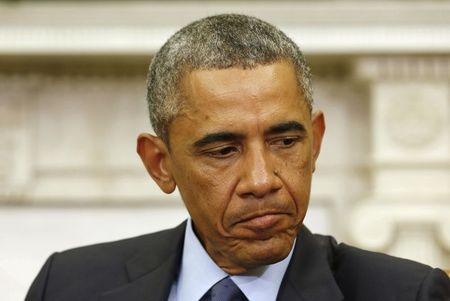By Amanda Becker and Timothy Gardner
WASHINGTON (Reuters) - Republicans plan to put approval of the long-delayed Keystone XL oil pipeline on a fast track early next year if they win a U.S. Senate majority in November, finally forcing President Barack Obama to make a tough call on the controversial plan.
The $10 billion Keystone project to connect Canadian oil sands with U.S. refineries will top the list of Republican energy priorities if they gain control of the Senate after the November 4 midterm elections. It could come as a stand-alone measure or attached to must-pass legislation such as a government spending or transportation bill, according to senators and congressional aides.
Republicans, along with some Democrats, have for years pushed for a bill that would allow Congress to approve Keystone, and reduce the role of the administration. However, with Democrats in control, the closest they have gotten in the Senate was a symbolic measure expressing support for the project.
Even so, Republican lawmakers say they have enough votes to pass Keystone - all they need is a new Senate leader who will allow them to vote on a proposal, since Democrat Majority Leader Harry Reid of Nevada has declined to do so.
That could happen if Republicans in November gain six net seats, including several in conservative states now held by Democrats, to secure a majority in the 100-member Senate. They are all but certain to retain control of the U.S. House of Representatives.
While the president can veto any bill that does not earn two-thirds support from the House and Senate, Republican Senator John Barrasso of Wyoming, a member of the Senate Energy Committee, says Keystone's popularity with a majority of American voters and organized labor, a key Obama constituency, will force his hand.
"If we put it on his desk, the broad support nationally for the Keystone pipeline, as well as the pressure he will get from the unions, will provide significant pressure on the president," Barrasso told Reuters.
TransCanada's pipeline, first proposed six years ago, is a rallying point for environmental groups opposed to increasing production of oil sands crude, which they say is high in emissions linked to climate change. They have urged Obama to reject the company's application at the State Department to build the 1,180 mile (1,900-km) cross-border line. The administration has delayed making a decision.
Energy industry executives say stopping the pipeline will not slow Canadian crude from reaching the world market and will prolong U.S. reliance on imports from less stable suppliers.
As stand-alone legislation, it would force Obama to either approve or reject the long-stalled plan. Attached to a must-pass but unrelated bill, it would put Obama in the uncomfortable position of either vetoing important legislation or accepting a congressional measure.
It is not uncommon for the U.S. Congress to pass legislation that contains unrelated provisions. Such measures have a better chance of being included in unrelated bills if they are broadly popular or have the backing of House and Senate leaders.
Republican Senator John Hoeven, an Energy Committee member from North Dakota, said that were at least 57 votes for Keystone now and he expected to have more after the mid-terms.
"We'll be able to pick the vehicle, and we'll have the 60 votes. We'll just attach it and pass it," Hoeven, who has sponsored several Keystone bills, told Reuters.
SIX YEARS AND COUNTING
So far, past Senate action on the pipeline has consisted of successful Energy Committee votes, attempts to attach approval to a now-dead energy efficiency proposal and symbolic measures.
The Senate in March voted 62-37 in favor of a non-binding Keystone proposal attached to a budget resolution, giving hope to pipeline backers that bipartisan support would be strong for an actual approval of the project.
In June, Democratic Senator Mary Landrieu, the current head of the energy panel, passed a bill out of the committee to approve the pipeline by a 12-10 vote, but Reid never brought it before the full Senate for a vote.
More than 60 percent of the public and nearly half of Democrats support the pipeline, according to a March Pew Research Center poll. The Laborer's International Union of North America and the leader of the AFL-CIO, the largest U.S. labor federation, both support it, saying it would create union jobs.
Keystone makes a good goal for Republicans since - even with a slim majority - it would be difficult for them to undo other key Obama energy and environmental initiatives, such as the Environmental Protection Agency's plan to curb carbon pollution from power plants.
A path to Keystone could be rocky, though. Obama has said he will only approve a plan that does not significantly exacerbate climate change. And it is unclear whether he would risk his environmental legacy by signing a Keystone bill or opt to veto and wait for the State Department to make a recommendation on the project.
Spearheading any effort to force the president's hand would be the presumed leader of a Republican-controlled Senate, current Minority Leader Mitch McConnell, from coal-producing Kentucky. Energy policy would also probably be shepherded by Lisa Murkowski from oil and gas-rich Alaska, who is expected to lead the Senate Energy Committee if Republicans take control.
Her agenda would start with areas where there is bipartisan support since "whatever the Senate passes has to pass both the House and the President's desk," spokesman Robert Dillon said.
McConnell, who is locked in a tight re-election race, has pledged, if he becomes leader, to eliminate procedural hurdles that have prevented the Senate from debating and voting on bills.

"If we have a new majority next year ... the Keystone pipeline will be voted on," McConnell told reporters recently. "I will be the one setting the agenda."
(Editing by Ros Krasny and Tomasz Janowski)
